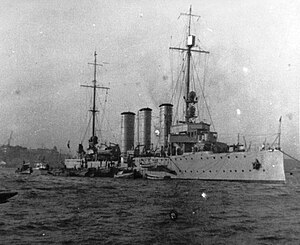 In French service as Colmar during her deployment to China in 1924
| |
| History | |
|---|---|
| Name | SMS Kolberg |
| Namesake | Kolberg |
| Laid down | 1908 |
| Launched | 14 November 1908 |
| Completed | 21 June 1910 |
| Fate | Scrapped, 1929 |
| General characteristics | |
| Class and type | Kolberg-class cruiser |
| Displacement | |
| Length | 130.50 m (428 ft 2 in) |
| Beam | 14 m (45 ft 11 in) |
| Draft | 5.38–5.58 m (17 ft 8 in – 18 ft 4 in) |
| Installed power | |
| Propulsion |
|
| Speed | 25.5 knots (47.2 km/h; 29.3 mph) |
| Range | 3,250 nmi (6,020 km; 3,740 mi) at 14 knots (26 km/h; 16 mph) |
| Complement | 367 |
| Armament |
|
| Armor |
|
SMS Kolberg was a light cruiser of the German Kaiserliche Marine (Imperial Navy) during the First World War, the lead ship of her class. She had three sister ships, SMS Mainz, Cöln, and Augsburg. She was built by the Schichau-Werke; her hull was laid down in early 1908 and she was launched later that year, in November. She was commissioned into the High Seas Fleet in June 1910. She was armed with a main battery of twelve 10.5 cm SK L/45 guns and had a top speed of 25.5 kn (47.2 km/h; 29.3 mph).
Kolberg saw action in several engagements with the British during the war, including the raid on Scarborough, Hartlepool and Whitby in December 1914 and the Battle of Dogger Bank the following month. She also saw action against the Russians on two occasions, during the Battle of the Gulf of Riga in August 1915 and Operation Albion in November 1917. After the end of the war, she was ceded to France as a war prize and renamed Colmar. She served only briefly in the French Navy, including a deployment to Asia in 1924. She was stricken in 1927 and broken up two years later.